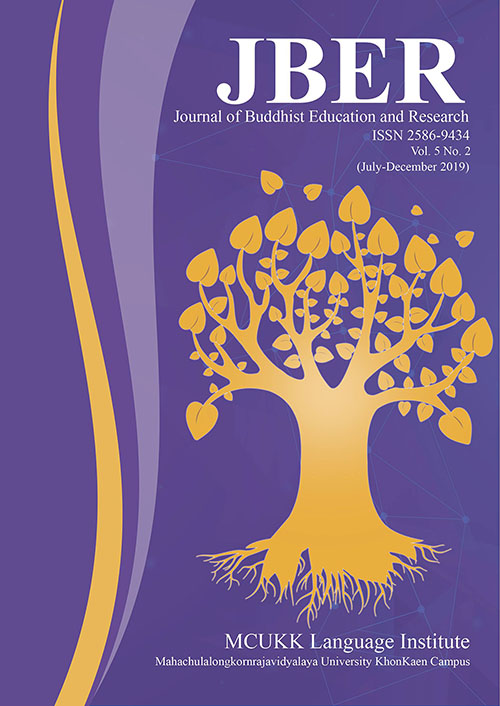LEARNING MANAGEMENT OF SOCIAL STUDIES, RELIGION AND CULTURE DEPARTMENT BY BUILDING FAITH AND THINKING METHODS IN ACCORDANCE WITH THE PRINCIPLES OF YONISOMANASIKĀRA FOR DEVELOPING CRITICAL THINKING SKILLS IN THAILAND 4.0 ERA OF KHAO SUAN KWANG WITTAYANUKUL HIGH SCHOOL STUDENTS, KHON KAEN PROVINCE
Keywords:
faith building, thinking methods according to Yonisomanasikāra, Develop critical thinking skills, Thailand 4.0Abstract
This research aimed to To study the conditions of learning management and Comparison of learning management and to present the suggestions for the learning management of Social Studies, Religion and Culture Department by building faith and thinking methods in accordance with the principles of Yonisomanasikāra for developing the critical thinking in Thailand 4.0 era of Khao Suan Kwang Wittayanukul high school students in Khon Kean province. The population and sample were the upper high school students from 187 which were 127 samples by specifying the sample sizes according to the Crazy and Morgan tables (Krejcie & Morgan, 1970) and classifying the Startified Random Sampling and compare the proportion from the population Get samples in each subgroup By random sampling (Simple Random Sampling) by the lottery method high school students and this study was carried out by means of mixed method research: qualitative research methodology and quantitative research methodology. The tools used in this study were the questionnaire and interview form. The statistics used in data analysis were: Frequency, Percentage, Mean, Standard Deviation, F-test (One Way Anova) and a paired comparison method of Scheffe. The research results were as follows:
1. In overall, the conditions of the learning management of Social Studies, Religion and Culture Department by building faith and thinking methods in accordance with the principles of Yonisomanasikāra (analytic thinking) for developing the critical thinking in Thailand 4.0 era of Khao Suan Kwang Wittayanukul high school students in Khon Kean province were statistically rated at a high level in all four aspects. The highest once was seen in the aspect of learning management, followed by that of learning evaluation, faith building, thinking methods based on Yonisomanasikāra principles and learning activity management respectively.
2.The comparative study results classified by students’ classes showed indifferences with the statistical significance level of.05; this denied the prior set hypothesis. Classified by the students’ GPA, the difference with the statistical significance level of.05 was seen in one pair; that is, the score of those with GPA 3.01-3.50 who had thinking methods based on Yonisomanasikāra in developing the critical thinking in Thailand 4.0 era was higher than that of those with GPA 2.00-3.00. This accepted the set hypothesis.
3. Suggestion and guidelines for the learning management are that the modern technology innovation in Thailand 4.0 era should be applied in learning, combined with course content; organizing activities by facing real situations should be focused for making students to learn from direct experience, integrated to achieve advanced thinking skill development by emphasizing the ways to let the students to consider, think critically and reasonably to enhance creative thinking skills with a variety of learning activities, encourage students to express themselves, give them opportunities in presenting new ideas, let teachers, students involved in exchanging ideas and presenting ideas, provide an environment to enhance the interesting learning atmosphere and encourage students to participate wholeheartedly along with the Buddhist principles leading to real life. This is a holistic development which can be extended to more efficient development.
References
บุญชม ศรีสะอาด. (2554). การวิจัยเบื้องต้น. กรุงเทพฯ : บริษัทสุวีริยาสาส์น.
นวรัตน์ รามสูต และบัลลังก์ โรหิตเสถียร. การศึกษาไทย 4.0 ในบริบทการจัดการศึกษาเพื่อการพัฒนาทียั่งยืน. ข่าวสำนักงานรัฐมนตรี. สืบค้นเมื่อ 24 มิถุนายน 2562 จาก http://www.moe. go.th/websm/2016/aug/354.html.
รุ่งลาวัลย์ ละอำคา. รูปแบบการเรียนการสอนโดยสร้างศรัทธาและโยนิโสมนสิการ : เส้นทางแห่งปัญญาเพื่อการพัฒนาครูและศิษย์. วารสารวิจัยเพื่อพัฒนาสังคมและชุมชน มหาวิทยาลัยราชภัฏมหาสารคาม. 2(4),19-20.
สมควร นามสีฐาน ทวีศิลป์ สาระแสน และประยูร แสงใส. การพัฒนานวัตกรรมการสอนสังคมศึกษาแนวพุทธในศตวรรษที่ 21. วารสารบัณฑิตศึกษามหาจุฬาขอนแก่น. 5(1), 82.
เสาวลักษณ์ พิสิษฐ์ไพบูลย์. ขับเคลื่อนการศึกษาไทยสู่ไทยแลนด์ 4.0. หนังสือพิมพ์ไทย โพสต์. 14 ตุลาคม 2559. หน้า 2. สืบค้นเมื่อ 24 มิถุนายน 2562 จาก http://www.thaihealth. or.th/Content/33499.
สุมน อมรวิวัฒน์. (2542). สมบัติทิพย์ทางการศึกษาไทย. กรุงเทพฯ : จุฬาลงกรณมหาวิทยาลัย.
ธนัท อู๊ดน้อย. (2559).การศึกษาผลสัมฤทธิ์ทางการเรียน และความสามารถในการคิดตามหลักโยนิโสมนสิการ เรื่องแนวโน้มการเปลี่ยนแปลงทางสังคม และปัญหาสังคม ของนักเรียนชั้นมัธยมศึกษาปีที่ 4 ด้วยการจัดการเรียนรู้โดยการสร้างศรัทธา และโยนิโสมนสิการ. Veridian E-Journal Silpakorn University ฉบับภาษาไทย สาขามนุษยศาสตร์ สังคมศาสตร์ และศิลปะ. 9(2), 1802-1803.
วิญญู เถาถาวงษ์. การจัดการเรียนรู้แบบแบบโยนิโสมนสิการ. วารสารวิชาการศึกษาศาสตร์ มมร. 3(2), 1-2.
วิทยา ทองดี และศุภวิชญ์ โรมแพน. (2561). แนวทางการพัฒนาการสอนสังคมศึกษาตามแนวพุทธยุคไทยแลนด์ 4.0. วารสารวิชาการธรรมทรรศน์. 18(2), 281–293.





